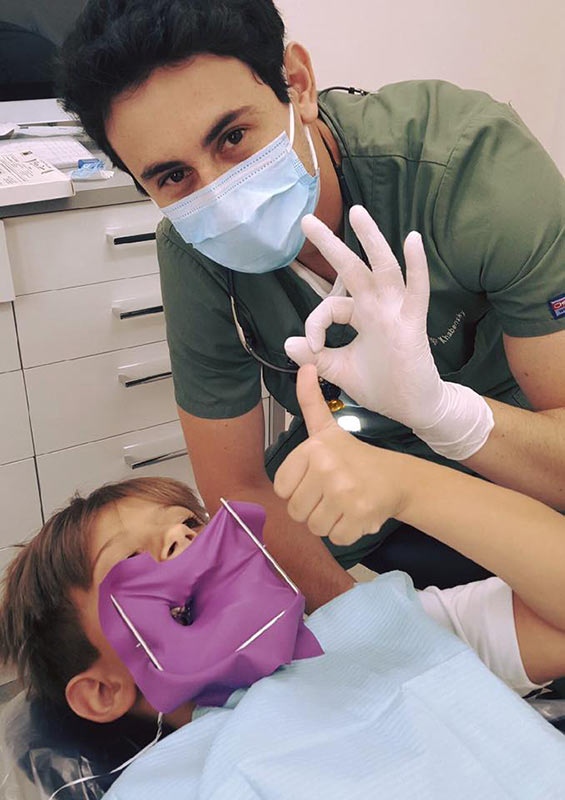A Comprehensive Guide to Pediatric Dental Treatment and Its Duty in Stopping Usual Dental Problems
Understanding pediatric dental care is vital for developing a structure of long-lasting oral health and wellness in kids. Early oral sees, proper oral hygiene methods, and nutritional awareness are important elements that can dramatically alleviate the threat of usual oral problems such as cavities and malocclusion.
Relevance of Very Early Oral Visits
Identifying the importance of early dental visits can establish the foundation for a kid's lifelong oral health and wellness. Establishing a relationship with a pediatric dental expert as very early as the eruption of the initial tooth, commonly around 6 months old, is crucial. These initial visits not only familiarize children with the oral setting however also enable for early discovery of possible concerns, such as misalignment or dental caries.
Early oral exams encourage caregivers with useful expertise relating to proper oral treatment, nutritional recommendations, and the prevention of oral diseases. Pediatric dental professionals are competent in dealing with the special demands of youngsters, guaranteeing that they receive age-appropriate education and learning on oral hygiene. Additionally, these gos to provide a possibility to go over routines such as thumb-sucking and pacifier use, which can affect dental growth.
Necessary Oral Health Practices
Developing a solid foundation for a kid's dental health and wellness goes past routine oral sees; it also entails instilling effective dental hygiene practices from an early age. Caretakers and parents play an important role in teaching children proper techniques to maintain their oral health and wellness.

Flossing ought to start when 2 teeth touch, as this stops plaque build-up in hard-to-reach locations. Parents ought to aid their children with brushing and flossing until they are about seven or 8 years of ages to make certain thoroughness.
In addition, establishing routine oral exams every six months permits professional monitoring of oral wellness. Educating youngsters the significance of oral health and making it an enjoyable, appealing task can cultivate long-lasting healthy and balanced habits that are vital in preventing common dental problems.

Function of Nutrition in Dental Health
Nutrition plays a critical role in maintaining optimum oral health, as the foods youngsters eat can considerably influence the development and stamina of their teeth. A well-balanced diet plan abundant in essential vitamins and minerals is vital for developing solid enamel and supporting general dental wellness.
Alternatively, a diet regimen high in sugars and acids can result in harmful impacts on oral health. Sugary treats and beverages can promote the growth of dangerous microorganisms in the mouth, bring about boosted level of acidity and a greater danger of dental caries. It is crucial for caregivers to urge much healthier snack options, such as fruits, vegetables, and whole grains, which not just offer essential nutrients yet additionally promote saliva manufacturing, further shielding teeth.
Usual Oral Troubles in Children
Dental health and wellness problems are a typical problem for several moms and dads, as youngsters can experience a variety of issues that may affect their oral wellness. One common problem is tooth decays, or tooth cavities, which occur from the demineralization of tooth enamel because of acid-producing microorganisms. This condition is typically worsened by bad dietary practices, such as frequent cosmetic dentist office intake of sweet snacks and beverages.
Another common problem is malocclusion, where teeth are misaligned, bring about problems in attacking, eating, and speaking. This can arise from hereditary variables or practices such as thumb sucking and prolonged pacifier usage. Furthermore, go to these guys gingivitis, an early form of gum tissue condition, can take place in youngsters, usually because of inadequate dental hygiene practices. It is identified by red, swollen gums that may bleed during brushing.
Tooth injuries, including avulsions or fractures, are additionally regular amongst active youngsters. These can result from drops, sports, or crashes. Early recognition and intervention are essential in handling these troubles to stop additional difficulties. Routine oral check-ups play a vital duty in detecting and resolving these common dental problems effectively.
Structure Lifelong Dental Practices
Instilling great oral health techniques early in life sets the structure for a lifetime of healthy and balanced teeth and gums. Establishing a constant routine for cleaning and flossing is essential; kids need to brush their teeth twice a day with fluoride tooth paste and start flossing as quickly as 2 surrounding teeth touch. Parents play an essential role in modeling these actions, as children typically mimic grown-up methods.
Enlightening youngsters regarding the significance of oral treatment can better strengthen these habits. Usage appealing approaches, such as stories or interactive games, to assist them recognize why regular oral sees and correct hygiene are vital. Additionally, introducing a view website balanced diet reduced in sugar can significantly decrease the threat of cavities and promote dental wellness.
Regular dental exams, generally suggested every six months, give an opportunity for expert advice and early detection of prospective concerns. These gos to can also assist youngsters build a positive association with dental care. By promoting these behaviors and attitudes from a young age, parents can equip their children to take responsibility for their oral health and wellness, inevitably bring about a life time of certain smiles and decreased dental problems.
Final Thought

Early dental gos to, correct dental hygiene methods, and dietary understanding are critical elements that can dramatically minimize the risk of typical oral troubles such as dental caries and malocclusion.Early dental examinations encourage caretakers with valuable knowledge concerning appropriate dental treatment, nutritional referrals, and the prevention of dental diseases. Routine oral exams play an important function in finding and attending to these typical dental problems properly.
Early dental brows through, along with the execution of effective dental hygiene methods and correct nourishment, significantly contribute to the prevention of usual oral troubles such as dental caries and gingivitis. By instilling favorable dental practices from an early age, children are more likely to experience healthy teeth and gum tissues throughout their lives, inevitably cultivating a society of oral health that can be sustained right into the adult years.